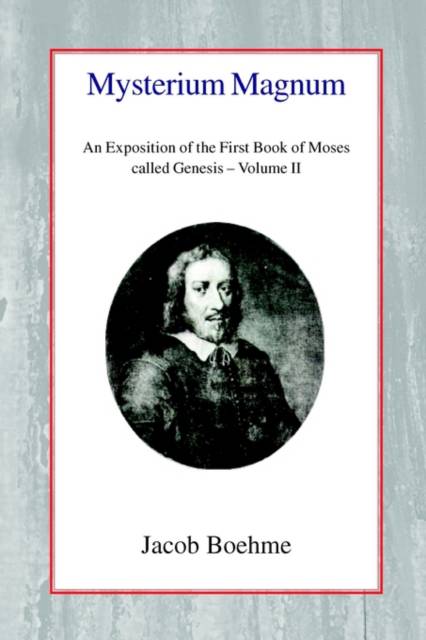
- Retrait gratuit dans votre magasin Club
- 7.000.000 titres dans notre catalogue
- Payer en toute sécurité
- Toujours un magasin près de chez vous
- Retrait gratuit dans votre magasin Club
- 7.000.0000 titres dans notre catalogue
- Payer en toute sécurité
- Toujours un magasin près de chez vous
Mysterium Magnum II
An Exposition of the First Book of Moses Called Genesis (Volume II)
Jacob Boehme
Livre broché | Anglais
33,95 €
+ 67 points
Description
Boehme was born in 1575. He received little if any formal education and was apprenticed to a shoemaker at Goerlitz in Saxony. From an early age he seems to have been devoted to the study of the Bible as well as having a growing, inner, sense of the reality of God. Walking one day in the fields, when he was twenty-five years old, the mystery of creation was suddenly opened to him, and 'in a quarter of an hour I saw and knew more than if I had been many years at the university ... and thereupon Iturned my heart to praise God for it.' He puzzled as to why such revelations should be given to him, who sought only the love of God. Ten years later he began to record what he received, and thus was born The Aurora, his first book, finished in 1612. At once his work found both friends and enemies. To the struggles of the former to understand him, we owe the gradual development of his capacity to convey and express more and more of that which he had received. Persecution by the Primate of Goerlitz made him leave home and settle in Dresden, where he died in 1624. Written in 1623, when his powers of expression had developed to their full, Mysterium Magnum is central to his work. Taking the form of an interpretation of Genesis, it outstrips its apparent confines, explaining the popularity of his work among followers as varied as Hegel, Law, Blake and Berdyaev. From the first sentence it leads to the heart of the experience of all mystics: 'When we consider the visible world with its essence, and consider the life of the creatures, then we find therein the likeness of the invisible spiritual world, which is hidden in the visible world as the soul in the body; and we see thereby that the hidden God is nigh unto all and, through all, and yet wholly bidden to the visible essence.'
Spécifications
Parties prenantes
- Auteur(s) :
- Editeur:
Contenu
- Nombre de pages :
- 450
- Langue:
- Anglais
Caractéristiques
- EAN:
- 9780718891251
- Date de parution :
- 19-09-02
- Format:
- Livre broché
- Format numérique:
- Trade paperback (VS)
- Dimensions :
- 155 mm x 234 mm
- Poids :
- 675 g

Les avis
Nous publions uniquement les avis qui respectent les conditions requises. Consultez nos conditions pour les avis.






